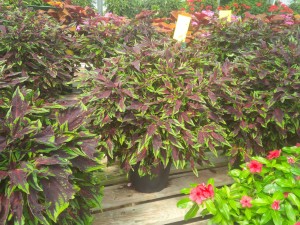 I dislike most kinds of shopping, but there are two kinds of “brick and mortar” merchants that I will happily visit: book stores and garden centers. Why? Because they offer unique experiences that I find irresistible.
I dislike most kinds of shopping, but there are two kinds of “brick and mortar” merchants that I will happily visit: book stores and garden centers. Why? Because they offer unique experiences that I find irresistible.
In my part of the world, at least four independent garden centers have closed over the last five years, with two leaving the scene in the last 12 months. Their skeletons survive, with the empty plant pallets and shuttered buildings telling a woeful tale of changing buying habits, the predominance of big-box stores and the homogenization of the horticultural industry.
I miss them all because I love the experience of stopping at a garden center to buy a specific plant and going home with a couple of bags of mulch, a few interesting annuals for the containers and maybe an eye-catching perennial. Sometimes I even end up buying the plant that I was looking for in the first place.
I also miss the shuttered garden centers, because in most of them you can find people to talk to about plants. Either an owner or manager will be on the premises and the employees—with the exception of temporary summer help—are usually happy to answer questions, make plant recommendations or just gossip about gardening.
But operating a local garden center is a chancy business. Profit margins are narrow when you deal with living inventory, and the cost of labor to keep that living inventory in good condition is high. Seasonality is a problem, unless the garden center is large enough to operate a year-round business that encompasses indoor plants, winter holiday decorations, tools and gardenalia. Even then, the bulk of sales happen between April and the end of July, with a little surge in early fall and at holiday time.
In populated areas, the real estate under a particular garden center may be much more valuable than the business itself. Owners, especially those close to retirement age, have a strong incentive to cash out.
The big-box stores generally beat the independents on price. They buy plants by the thousands from commercial growers and can certainly boast economies of scale. If you get to your local big-box store soon after it receives plant deliveries, you can buy reasonably healthy plants at good prices. However, you have to be very lucky to find an employee at all, let alone one who knows something about growing conditions, relative light requirements, or anything else that is not already on the plant tag.
The offerings have a stultifying sameness. A big box store in Maine sells nearly the same array of plants as its big-box sibling in Virginia. Plants are sold in bloom at the time when they are most likely to be in demand. If you want a garden chrysanthemum to plant in spring, for example, you won’t find it at your local mega-merchandiser.
Online retailing has also hurt the local garden centers. Anyone with an internet connection can now order garden merchandise–from a solar-powered birdbath to an exotic azalea–and those items are delivered promptly. Time is the most precious commodity available to most of us and anything that saves a few minutes is highly desirable. It doesn’t hurt that if you have a yen for that exotic azalea at 2 am, you can satisfy the craving with a few clicks and go back to bed.
But if you love plants, you should love independent nurseries. Most are locally owned, which means that you are supporting small business in your own community. The plant selection generally encompasses more than just the run of the mill annuals, perennials and shrubs available in big-box stores. Local vendors tend to stock several varieties of a plant, not just this year’s hottest new entrant in the world horticultural sweepstakes. Frequently you can buy plants that may not bloom for months and give them a healthy start in the garden. Good nurseries are also more likely to carry shrubs and trees that are larger and more mature than those offered elsewhere. The personnel will help you get those big plants to your car, which is not insignificant for many people.
My husband used to say that I should invest in a bumper sticker that reads, “I brake for garden centers”. He was absolutely right. I buy plants from any and all available sources, but I never fail to patronize local garden centers at home and in my travels. By doing so, I cast my vote for biodiversity, local business and a more varied and diverse horticultural marketplace.
